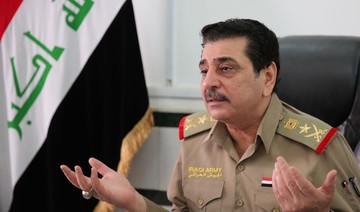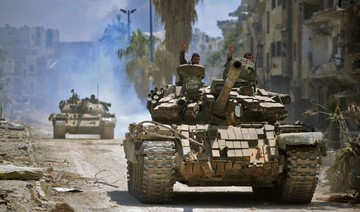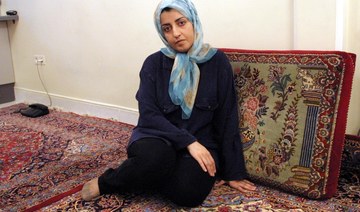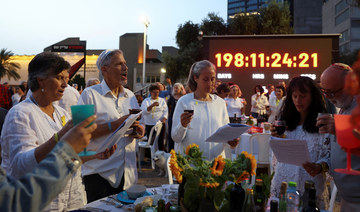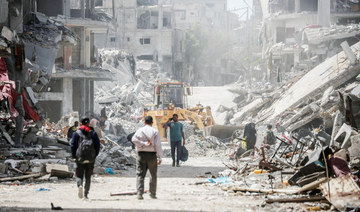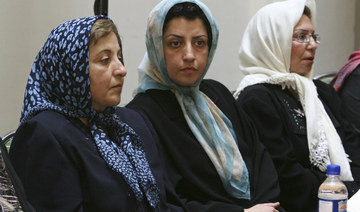DAMASCUS: Syrian police deployed across devastated districts in southern Damascus on Tuesday, according to state media, a day after the government captured the area from the Daesh group.
The government on Monday seized the Yarmuk Palestinian camp and adjacent neighborhoods of Tadamun and Hajjar Al-Aswad, putting Damascus fully under its control for the first time since 2012.
On Tuesday, police units entered Yarmuk and Hajjar Al-Aswad and planted the two-star Syrian flag there, state television reported.
It broadcast images of security forces atop a pockmarked multi-story building in Yarmuk where they had hung the national flag.
They had also plastered pictures of President Bashar Assad and his predecessor and father Hafez.
Other police officers gathered in the ravaged streets below and fired in the air in celebration.
“The police are present round-the-clock,” said one officer interviewed on the state broadcaster.
“Special units are deployed across the camp to help any civilians and protect their belongings,” he said.
It also showed footage from Hajjar Al-Aswad of a convoy of police cars and motorcycles making its way through dusty streets lined with crumbling buildings.
There were no civilians in sight.
Yarmuk, Hajjar Al-Aswad and the nearby district of Tadamun all lie in a southern pocket of Damascus that had escaped regime control for several years.
The government began losing its grip on parts of the capital in 2012, just one year after the conflict in Syria erupted.
But it has made a comeback this year, with Assad using a mix of military pressure and evacuation deals to flush rebels and militants out of Damascus and its outskirts.
His troops and allied Palestinian fighters turned their sights on Yarmuk and the other Daesh-held parts of the capital last month.
Daesh overran Yarmuk in 2015, but the massive Palestinian camp had already been ravaged by years of rebel infighting and government attacks.
Syria’s army announced it had seized Yarmuk from Daesh on Monday.
Several sources, including the Syrian Observatory for Human Rights and a military source close to Damascus, said the capture came after a negotiated withdrawal of Daesh fighters. The government has denied such a deal.
Syria police deploy in south Damascus after Daesh defeat
Syria police deploy in south Damascus after Daesh defeat
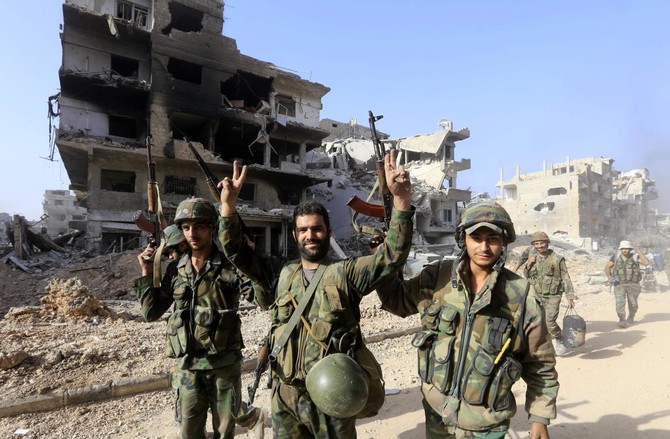
Tent compound rises in Khan Younis as Israel prepares for Rafah offensive
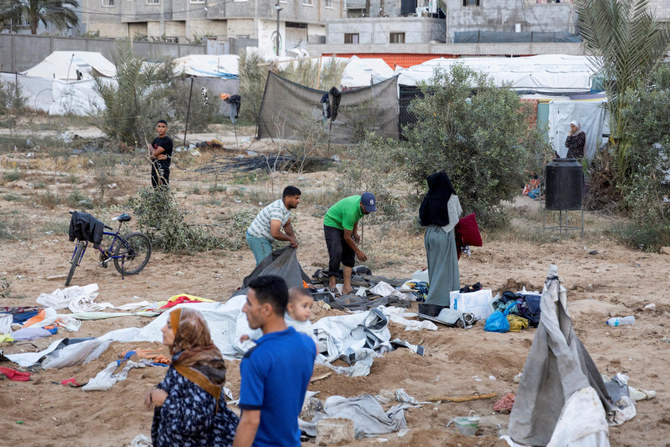
- Israel has said it plans to evacuate civilians from Rafah during an anticipated offensive on the southern city
- The Israel-Hamas war has killed more than 34,000 Palestinians
The tent construction is near Khan Younis, which has been targeted by repeated Israeli military operations over recent weeks. Israel has said it plans to evacuate civilians from Rafah during an anticipated offensive on the southern city, where hundreds of thousands of people have taken refuge during the war, now in its seventh month.
Also Monday, a failed rocket strike was launched at a base housing US-led coalition forces at Rumalyn, Syria, marking the first time since Feb. 4 that Iranian-backed militias have attacked a US facility in Iraq or Syria, a US defense official said. No personnel were injured in the attack, and no group has claimed responsibility for the attack.
The conflict has sparked regional unrest pitting Israel and the US against Iran and allied militant groups across the Middle East. Israel and Iran traded fire directly this month, raising fears of all-out war.
The war was sparked by the unprecedented Oct. 7 raid into southern Israel in which Hamas and other militants killed around 1,200 people, mostly civilians, and abducted around 250 hostages. Israel says militants are still holding around 100 hostages and the remains of more than 30 others.
The Israel-Hamas war has killed more than 34,000 Palestinians, according to local health officials, at least two-thirds of them children and women. It has devastated Gaza’s two largest cities and left a swath of destruction. Around 80 percent of the territory’s population have fled to other parts of the besieged coastal enclave.
The US House of Representatives approved a $26 billion aid package on Saturday that includes around $9 billion in humanitarian assistance for Gaza, which experts say is on the brink of famine, as well as billions for Israel. The US Senate could pass the package as soon as Tuesday, and President Joe Biden has promised to sign it immediately.
Iran’s foreign minister calls EU sanctions ‘regrettable’
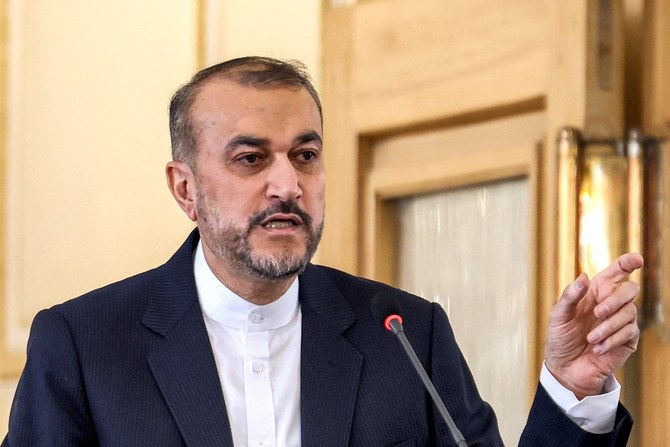
- EU foreign ministers agreed in principle to expand sanctions on Iran by agreeing to extend restrictive measures on Tehran’s weapons exports
DUBAI: European Union sanctions announced following Iran’s attack against Israel are “regrettable” because the country was acting in self-defense, Iran’s Foreign Minister Hossein Amirabdollahian posted on X on Tuesday.
Iran launched more than 300 drones and missiles on Israel in what it said was retaliation against a suspected Israeli bombing of its embassy compound in Damascus.
On Monday, EU foreign ministers agreed in principle to expand sanctions on Iran by agreeing to extend restrictive measures on Tehran’s weapons exports of any drone or missile to Iranian proxies and Russia.
“It is regrettable to see the EU deciding quickly to apply more unlawful restrictions against Iran just because Iran exercised its right to self-defense in the face of Israel’s reckless aggression,” Amirabdollahian said on X, before calling on the EU to apply sanctions on Israel instead.
More work will need to follow in Brussels to approve a legal framework before the expansion of the sanctions can take effect.
Israel’s Gaza war has negatively impacted human rights, says US report

- Rights issues include credible reports of unlawful killings, enforced disappearances and torture, says report
- Israeli military's conduct has come under scrutiny as its forces have killed over 34,000 in Gaza since Oct. 7
WASHINGTON: The war between Israel and Hamas that has killed tens of thousands of Palestinians in Gaza and resulted in a severe humanitarian crisis has had “a significant negative impact” on the human rights situation in the country, the US State Department said in its annual report on Monday.
Significant human rights issues include credible reports of arbitrary or unlawful killings, enforced disappearance, torture and unjustified arrests of journalists among others, said the State Department’s 2023 Country Reports on Human Rights Practices.
The report added that the Israeli government has taken some credible steps to identify and punish the officials who may have been involved in those abuses.
Israel’s military conduct has come under increasing scrutiny as its forces have killed 34,000 Palestinians in Gaza, according to the enclave’s health authorities, many of them civilians and children. The Israeli-occupied Gaza Strip has been reduced to a wasteland, and extreme food shortages have prompted fears of famine.
Israel launched its assault in response to a Hamas attack on Oct. 7, in which Israel says 1,200 people were killed.
Rights groups have flagged numerous incidents of civilian harm during the Israeli army’s offensive in Gaza, as well as raised alarm about rising violence in the Israeli-occupied West Bank, where Palestinian Health Ministry records show Israeli forces or settlers have killed at least 460 Palestinians since Oct. 7. But so far the Biden administration has said it has not found Israel in breach of international law.
Washington gives $3.8 billion in annual military assistance to its longtime ally. Leftist Democrats and Arab American groups have criticized the Biden administration’s steadfast support for Israel, which they say provides it with a sense of impunity.
But this month, President Joe Biden for the first time threatened to condition support for Israel, and insisted that it take concrete steps to protect humanitarian aid workers and civilians.
Israel’s Gaza war has negatively impacted human rights, says US report
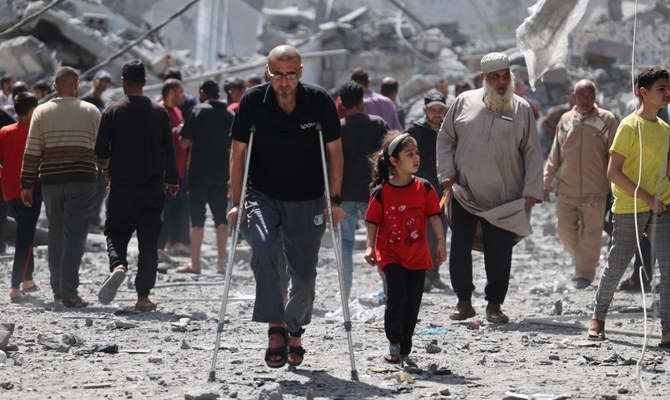
- The Israeli-occupied Gaza Strip has been reduced to a wasteland, and extreme food shortages have prompted fears of famine
WASHINGTON: The war between Israel and Hamas that has killed tens of thousands of Palestinians in Gaza and resulted in a severe humanitarian crisis has had “a significant negative impact” on the human rights situation in the country, the US State Department said in its annual report on Monday.
Significant human rights issues include credible reports of arbitrary or unlawful killings, enforced disappearance, torture and unjustified arrests of journalists among others, said the State Department’s 2023 Country Reports on Human Rights Practices.
The report added that the Israeli government has taken some credible steps to identify and punish the officials who may have been involved in those abuses.
Israel’s military conduct has come under increasing scrutiny as its forces have killed 34,000 Palestinians in Gaza, according to the enclave’s health authorities, many of them civilians and children. The Israeli-occupied Gaza Strip has been reduced to a wasteland, and extreme food shortages have prompted fears of famine.
Israel launched its assault in response to a Hamas attack on Oct. 7, in which Israel says 1,200 people were killed.
Rights groups have flagged numerous incidents of civilian harm during the Israeli army’s offensive in Gaza, as well as raised alarm about rising violence in the Israeli-occupied West Bank, where Palestinian Health Ministry records show Israeli forces or settlers have killed at least 460 Palestinians since Oct. 7. But so far the Biden administration has said it has not found Israel in breach of international law.
Washington gives $3.8 billion in annual military assistance to its longtime ally. Leftist Democrats and Arab American groups have criticized the Biden administration’s steadfast support for Israel, which they say provides it with a sense of impunity.
But this month, President Joe Biden for the first time threatened to condition support for Israel, and insisted that it take concrete steps to protect humanitarian aid workers and civilians.
Nobel laureate urges protest against Iran’s ‘war on women’
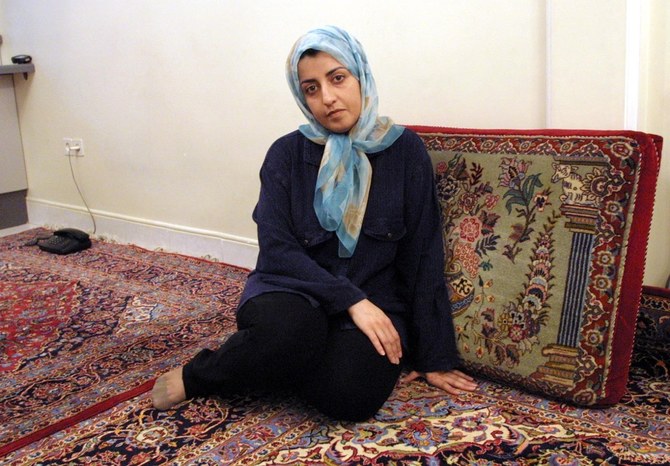
- Narges Mohammadi issues plea from Evin prison amid new crackdown by Tehran’s morality police
JEDDAH: Jailed Iranian Nobel laureate Narges Mohammadi urged Iranians on Monday to protest against the clerical regime’s “war against women” amid a new crackdown forcing women to cover their heads.
Mohammadi, who is being held in Evin prison in Tehran, called on Iranian women to share their stories of arrest and sexual assault at the hands of the authorities.
Iran launched a nationwide operation this month to enforce the wearing of the headscarf. Women have been arrested and taken to police stations by the morality police, and the Farsi hashtag meaning “war against women” has been trending on social media.
“People of Iran, I ask you, artists, intellectuals, workers, teachers, and students ... inside and outside the country to protest against this war against women,” Mohammadi said in a message from inside the prison. “Do not underestimate the power of sharing your experiences. Doing so will expose the misogynistic government and bring it to its knees.” She accused the authorities of bringing “a full-scale war against all women to every street in Iran.”
Mohammadi said she had been joined in jail by Dina Ghalibaf, a journalist and student who was arrested after accusing security forces on social media of putting her in handcuffs and sexually assaulting her during a previous arrest at a metro station. “For years, we have witnessed many women who have endured assault, abuse, and beatings by government agents,” Mohammadi said.
Mohammadi, 52, was awarded the Nobel Peace Prize last year in recognition of her campaign for human rights in Iran, which has led to her spending much of the past two decades in and out of jail. She has been imprisoned since November 2021 and has not seen her husband and twin children, who live in Paris, for several years.


